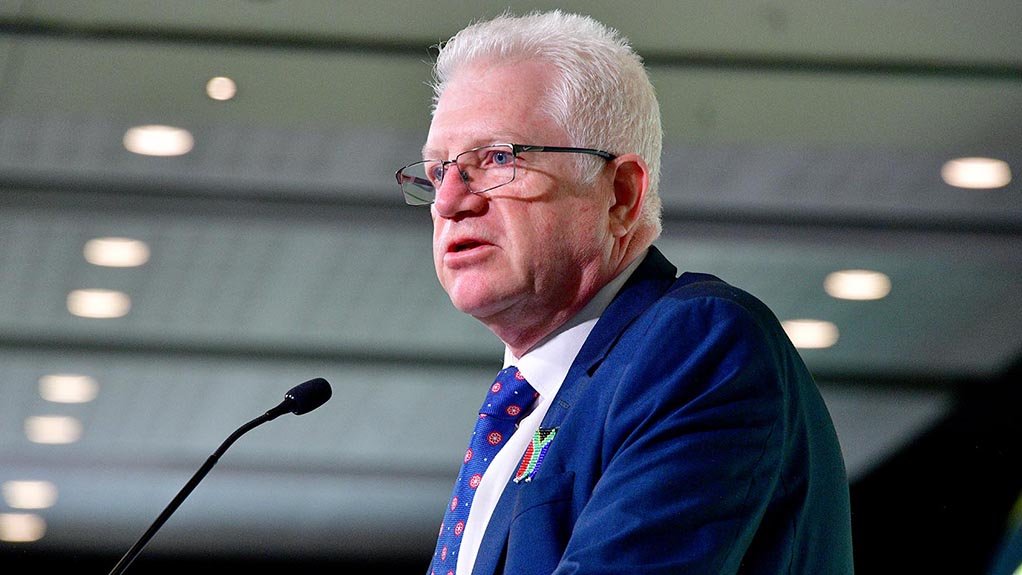Western Cape Premier Alan Winde highlighted on Wednesday that South Africa still faces an energy crisis. Although loadshedding (scheduled rotating power cuts) has stopped, the country is still dependent on an ageing fleet of coal-fired power stations, he pointed out, while delivering the opening address for the Solar & Storage Live Cape Town 2025 conference and exhibition, being held at the Cape Town International Convention Centre.
“My theme is – never, ever, waste a crisis!” he asserted, citing the example of Cape Town’s Day Zero water crisis, when, during the 2017-18 drought, the city came within 14 days, he reported, of completely running out of water. It didn’t, because Cape Townians changed their behaviour. Before the crisis, the city, then with a population of 4-million people, had used 1.2-billion litres of water a day (l/d). Today, with a population for 5-million (25% larger), the city used 800-million l/d of water.
That proved that people could change their behaviour significantly, and maintain that new behaviour. The relevance of this to energy was that, just because there was no longer any loadshedding, people should not relax. On the contrary, it was time to put the foot down on the accelerator for the transition to especially solar energy, he stressed. There was a need to move in the direction of making “everything” solar and battery, in energy terms. (He did acknowledge that other clean energies were also available.)
He noted that a huge range of everyday systems and devices were powered by electricity, derived from rechargeable batteries. He also observed that farmers in the Ceres district were unable to get enough electricity from the national grid. Consequently, they were installing solar energy to make up their shortfalls. But they, and other users, also needed large battery storage systems.
And one type of large-scale battery storage system was the “water battery”, like Cape Town’s Steenbras Dam hydroelectric power plant, where water stored in the dam was used to generate electricity. (Steenbras was a two-dam pumped storage system, with water from the upper dam used to generate electricity during peak demand times, and then, during off-peak times, water from the lower dam was pumped back into the upper dam, to “recharge” it.) Steenbras had reduced the impact of loadshedding on Cape Town and the Western Cape government was planning to create more such systems in the province.
In parallel, the province, which had set up an Energy Council to obtain expert advice during the loadshedding crisis, had decided to launch a major renewable-energy programme, to make itself sustainable from an energy point of view. The decision had been made to develop 5 700 MW of renewable-energy capacity by 2035. This would be significantly more that the province needed, in order to permit exports to other provinces and to allow for the growth of the Western Cape province. This energy would be cheaper energy, and cheaper energy would attract investment, and investment would create jobs, he pointed out.
Of this 5 700 MW target, 1 000 MW had already been delivered, he reported. And another 1 000 MW would be delivered by the end of this year. Independent consultants had told them that the province would achieve its ambition of being able to export electricity by 2032, and not 2035.
Regarding Africa as a whole, Winde highlighted that 600-million Africans did not have any electricity. Although the continent had large gas and petroleum reserves, climate change meant that they should not be used to generate electricity. Rather, the focus should be on solar power and battery storage.
And, regarding batteries, most of these were manufactured in China and South Korea. But most of the metals used to make them were mined in sub-Saharan Africa. “Why don’t we make batteries here?” he asked. “The next step must be the manufacturing of batteries here.”
EMAIL THIS ARTICLE SAVE THIS ARTICLE ARTICLE ENQUIRY FEEDBACK
To subscribe email subscriptions@creamermedia.co.za or click here
To advertise email advertising@creamermedia.co.za or click here











